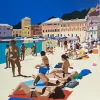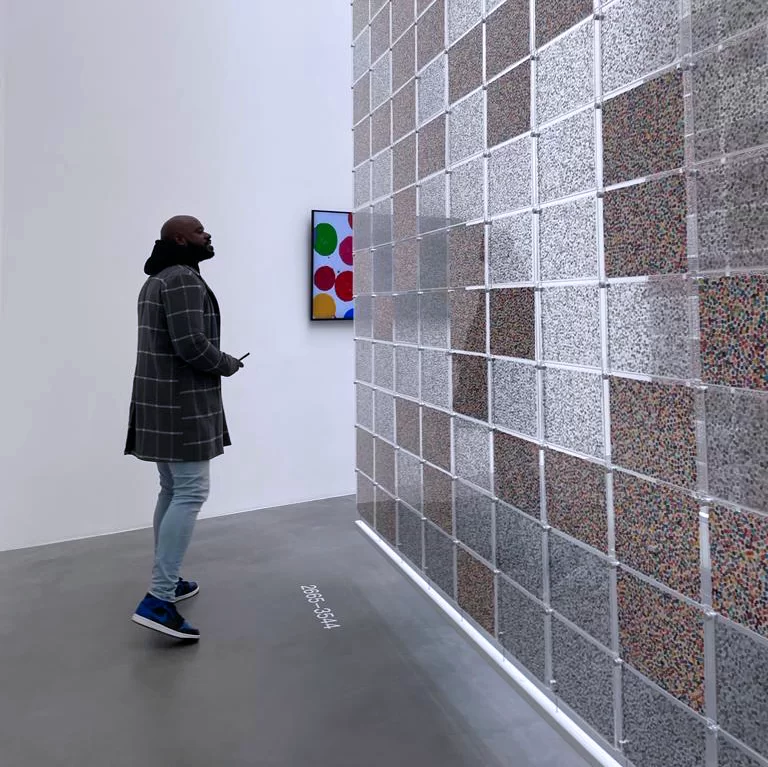It’s hard not to frown at what passes for contemporary art these days. At times, I feel caught in a paradox; there is so much art I like, and so much of it that feels, well, a bit… meh! We’re living in an era of unprecedented artistic production, where everyone—from their mum to their grandad and cousin—claims the title of “artist,” and many purveyors of aesthetics deem themselves curators, myself included.

Image courtesy of the artist
©MSCHF
The result is a world saturated with visual opinions, leaving much of what we encounter feeling like a movie reboot we never asked for. What’s missing in much of today’s art, and putting it out of reach of most people, is accessibility, shenanigans, depth, and a real sense of fun to tickle the intellect. It’s as if the art world has forgotten how to laugh at itself, or worse, has lost touch with the people it claims to represent.
A good painting is a good painting; let me rephrase that: a great piece of art is a great piece of art. But, as Grayson Perry aptly put it in the title of his 2014 book Playing to the Gallery—or more accurately, playing to an insular fraternity—has always been the prevailing consensus.
Thinking the art world is all “Kum ba yah”—all harmony and unity—is a dangerous fantasy. It can be a Game of Thrones with its fair share of Cerseis, Joffreys, Littlefingers, and not too many Snows. And the winter can be cold when the doors are closed. It gets tribal, no matter what corner of the holy cube you’re standing in.
Let me ask you this: how much art do you truly remember that made you stop and scrutinise without hitting the like button and scrolling on to the next aesthetic sentiment? I imagine very little.
Over the years, the practice of viewing art has become routine, a mechanical process of finger and thumb in the digital age. In real life (IRL), as they say, it’s often a swift swoop through the gallery to collect some images—”Hey, I was there”—but did you see? Did it connect? Can you still remember?
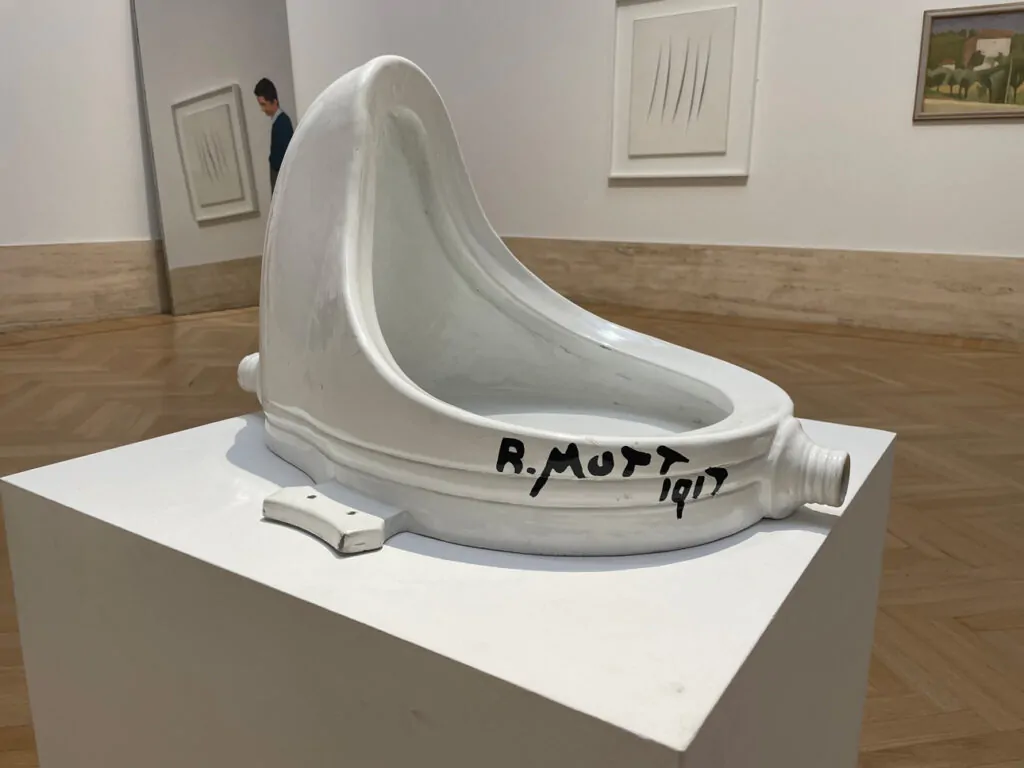
Image courtesy of Art Plugged
Participating in the tournament of being an artist in the social media era is like sitting at a slot machine at a Las Vegas casino, pulling the lever and hoping to hit the jackpot with every post. It’s a pursuit of popularity rather than an exercise in aesthetic talent.
So, what do you do, as an artist, in an age where the average attention span is said to be under eight seconds? You disrupt; in other words, you cause mischief. The Brooklyn-based art collective MSCHF has embraced this ethos in both name and practice, using their projects as a form of social commentary and critique, often placing art in spaces beyond the traditional gallery walls.
In many ways, the collective echoes the rebellious spirit of Marcel Duchamp, who took a urinal and, in doing so, flushed away tradition, leaving the world swirling in debate over what “art” really is and what it means. Just as Dada questioned the seriousness of art, MSCHF uses irony and humour to strip away the art world’s pretensions, making us question who art is really for.

Image courtesy of Art Plugged
Then we have Andy Warhol, whose screenprints pop-punched the art world, and Yves Klein, who monetised the concept of value itself, proving that in art, an idea can be worth its weight in gold—literally. These are artists who redefined the rules, inviting us to question the very nature of art and its relationship to capitalism, consumerism, and its role in culture and society.
Like them, MSCHF operates on its own terms, rewriting the rules of art, its meaning, and its methods of production. They sidestep tradition and the restrictive confines of popular consensus through consumerism, pop culture, and satire, executed with the effectiveness of a pop hit. With humour and social commentary that are consistent, potent, and incisive, you can’t help but laugh.
From the whimsical absurdity of their “Big Red Boot” to the audaciously dark reimagining of the Nike Air Max 97, MSCHF turns footwear into a statement, crafting sculptures for the feet that challenge sneaker culture head-on. These projects do more than blur the lines between art and commodity—they dare us to reconsider the very act of creation in a culture saturated by branding and hype.
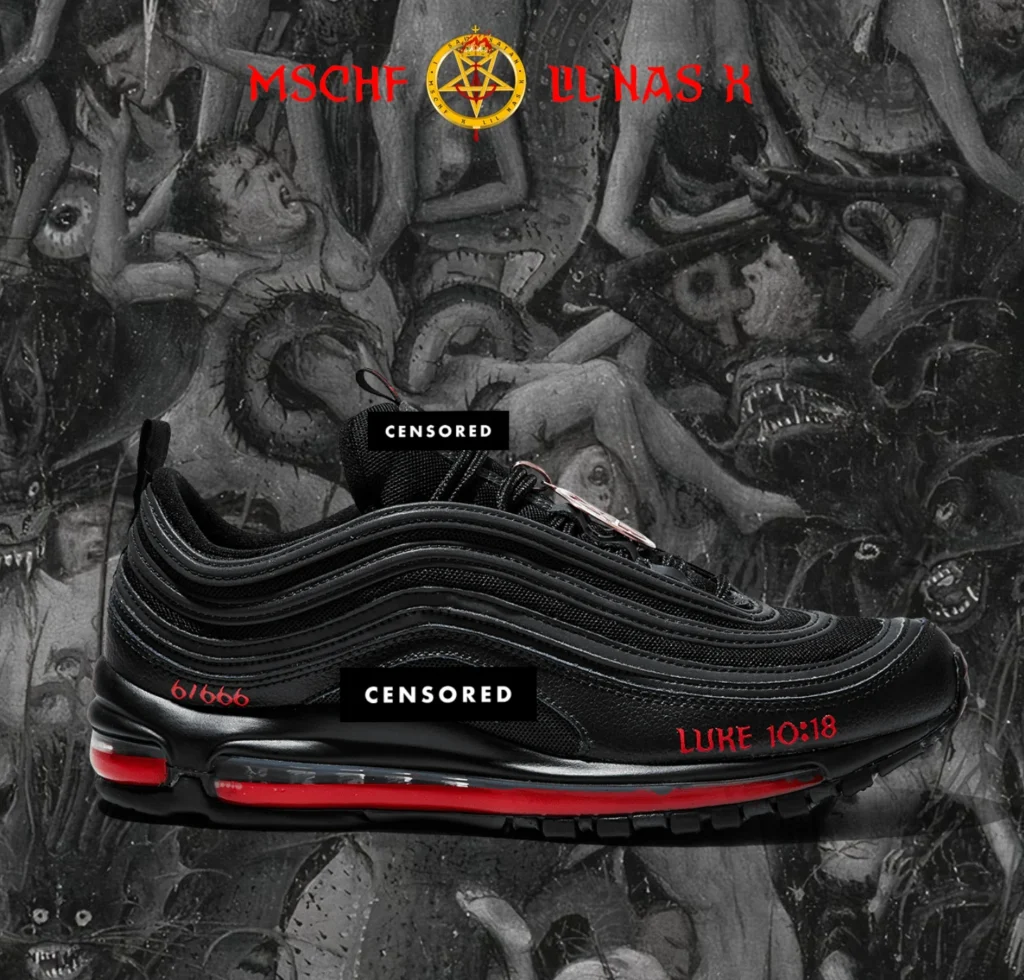
MSCHF x Lil Nas X
MSCHF Drop #43
Image courtesy of the artist © MSCHF
MSCHF’s “Museum of Forgeries” delivers a masterstroke in creative subversion. They bought a Warhol Fairy original, then conjured 999 replicas with the help of a robot—copies so flawless they’re indistinguishable from the authentic piece.
By erasing the line between the original and the imitation, they strip away the art world’s obsession with provenance and value. In true Warholian fashion, they blur the distinction between originality and replication. MSCHF leaves us with a question as philosophical as it is financial: in a world where anyone might own “the original,” what exactly is that worth? It’s a grappling yet disquieting thought: if authenticity itself is a mirage, what, then, is truly real?
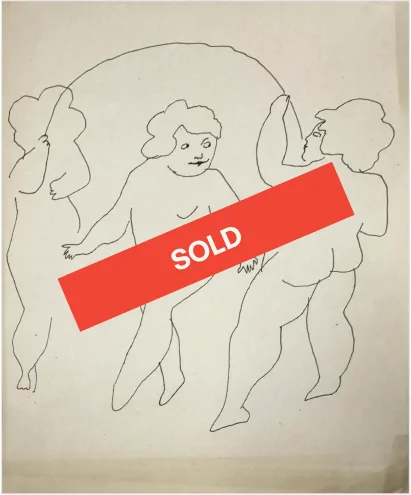
BY MSCHF, 2021
MSCHF Drop #59
Image courtesy of the artist © MSCHF
And how can we forget their “Severed Spots,” a dissection of the often absurd world of art investments? Taking one of Damien Hirst‘s iconic spot paintings, MSCHF treated it like a butcher’s block, carefully carving out each of the 88 coloured spots and selling each for $480. What remained was a bizarre Swiss-cheese-looking canvas, making us wonder if art’s true value lies in the whole or the sum of its parts.
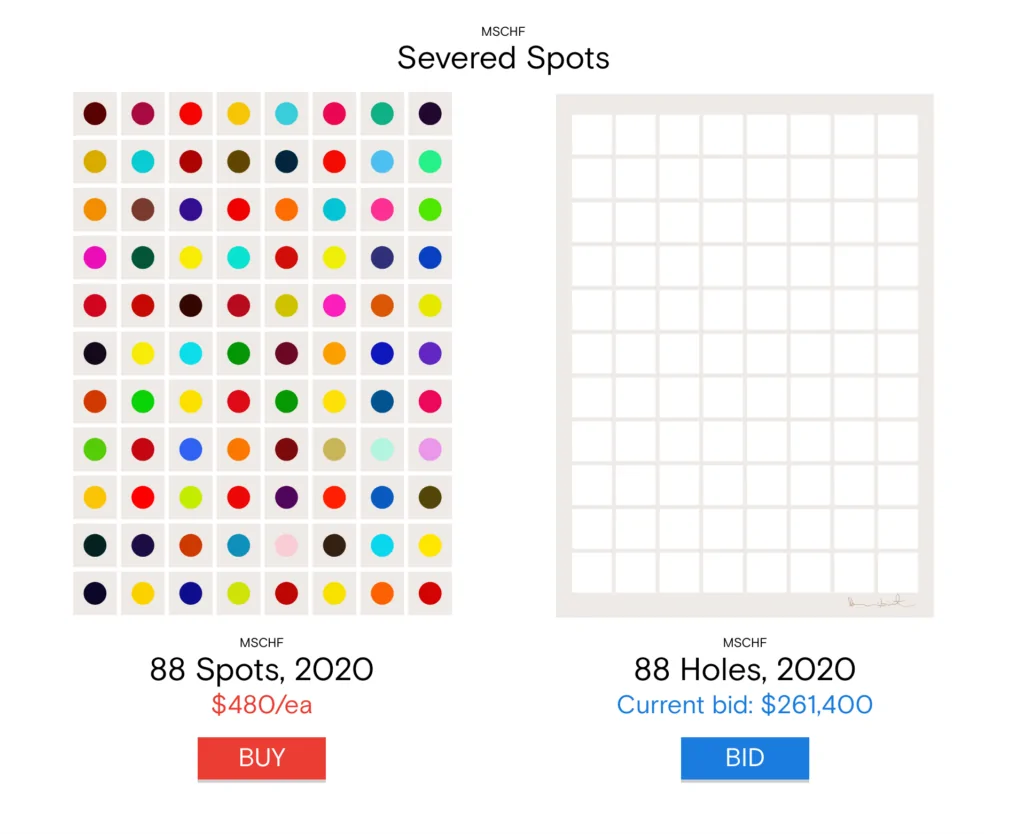
MSCHF Drop #20
Image courtesy of the artist
© MSCHF
Then there’s their “Dead Startup Toys,” a satirical homage to some of the tech industry’s most notorious failures. This collection features miniature replicas of five infamous startup products, each symbolising the pitfalls of overambition and flawed execution in the tech world—from Elizabeth Holmes’s Theranos to Juicero and more. With each piece, MSCHF blurs the line between art and product, forcing us to confront the absurdity of our own consumption habits.
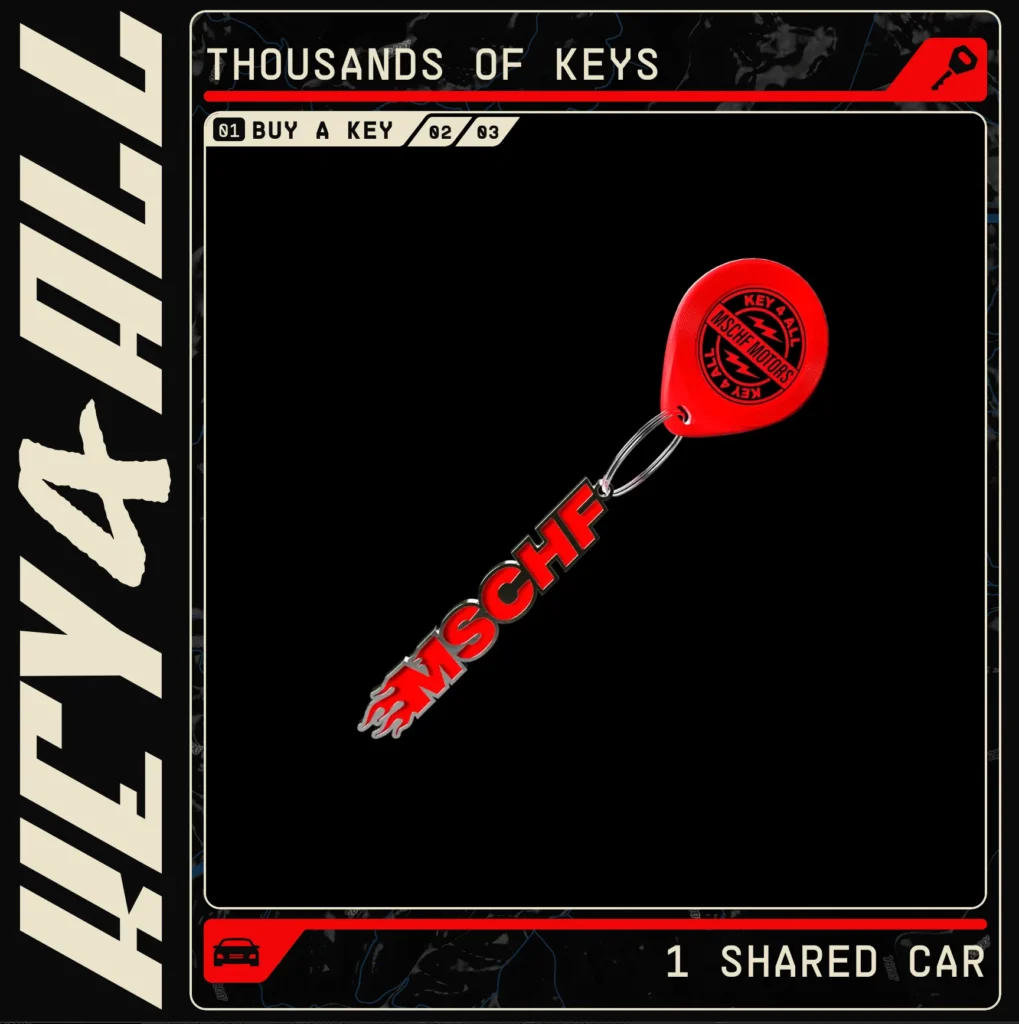
MSCHF Drop #84
Image courtesy of the artist © MSCHF
Then there’s Key4All, a performance piece of sorts—a hilarious takedown of the sharing economy that shows just how gloriously chaotic “shared ownership” can become. A thought-provoking experiment that plays like a real-life Grand Theft Auto remix—only instead of hijacking cars, you’re “borrowing” the same one everyone else has a key to. It’s the wild west of communal property and the chaos of shared resources. The beauty of the piece is that the audience’s participation completes it.
MSCHF’s magic lies in its ability to pull everyday life into a spectacle, pushing art from gallery walls into the world itself. Their work isn’t mere reflection; it’s disruption—compelling us to confront society head-on. In their hands, popular culture becomes an arsenal, turning the ordinary into something radical.
A radicalness that has garnered a few lawsuits with Big Corporations like Nike and Vans, sparking discussions surrounding the blurred line between intellectual property, artistic expression, and marketing in the digital age. In the face of this, MSCHF has maintained its disruptive path cultivating a cult-like following as it challenges the norms of consumer culture.
Despite their unconventional approach, MSCHF has gained recognition in the traditional art world; the collective is now represented by Perrotin and had its first museum retrospective, Nothing Is Sacred, last year in South Korea at Daelim Museum.
At this art collective’s core beats Warhol‘s vision of “business as art.” With each bi-weekly drop and every point of distribution, they transform commerce into a cultural critique—bold, direct, and unmistakably within reach. MSCHF gives me a sense that art still has the power to shock, reminding me that it can still unsettle, disrupt, and make me question the world in ways I never saw coming.
In the words of Cynthia Freeland, “But is it art?” The question is, why is it not?
To keep up to date with MSCHF and to participate in their drops, head over to their website 👉🏿 here
©2024 MSCHF



